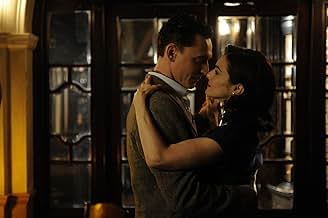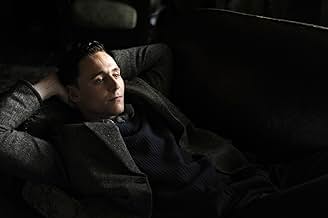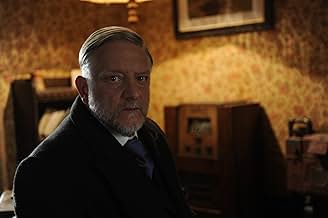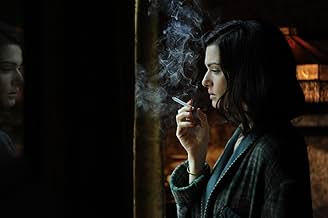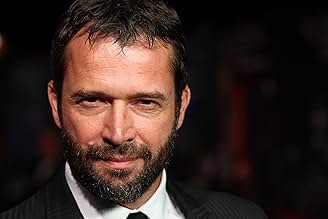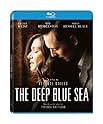IMDb-BEWERTUNG
6,2/10
17.165
IHRE BEWERTUNG
Die Frau eines britischen Richters findet sich in einer selbstzerstörerischen Liebesbeziehung mit einem Piloten der Royal Air Force wieder.Die Frau eines britischen Richters findet sich in einer selbstzerstörerischen Liebesbeziehung mit einem Piloten der Royal Air Force wieder.Die Frau eines britischen Richters findet sich in einer selbstzerstörerischen Liebesbeziehung mit einem Piloten der Royal Air Force wieder.
- Regie
- Drehbuch
- Hauptbesetzung
- Auszeichnungen
- 5 Gewinne & 13 Nominierungen insgesamt
Jorge Ojeda-Dávila
- Man in Bunker Bed
- (Nicht genannt)
Owen Thomas
- Caretaker
- (Nicht genannt)
Empfohlene Bewertungen
THE DEEP BLUE SEA is set in the 1950′s and flashes back to the War years of the 40′s – so it is appropriate that the title also features in a popular song lyric of the time ' we are all between perdition and the deep blue sea'.
London in 1950 was still very much showing the effects of the War and amid this drab and shattered cityscape, in a small dingy flat, Hester ( Rachel Weisz) has decided to commit suicide using the gas meter, but is revived. Hester had been married to the wealthy but tightly wound Judge, Sir William Collyer, but left him to live with a dashing ex RAF pilot, Freddie Page. The story takes place over a single day about ten months after Hester leaves her husband.
This was originally a Terence Rattigan play that first went to screen in the 1950′s with Vivian Leigh in the lead role and Kenneth More as Freddie and Eric Portman as the stern judge. Rachel Weisz is nothing short of incandescent in the part. She is a polished, accomplished actress who keeps getting better as she goes on. Hester has taken what many would say, a wild and foolish step in leaving her safe and affluent husband for the feckless Freddie and a relationship that while initially passionate, intense and thrilling, is ultimately doomed, as less than a year after the move, Freddie is more centred on drinking in pubs and playing golf while Hester sits forlorn and neglected in a shabby, dingy flat. It is her birthday, Freddie has forgotten. She is alone.
The editing, direction and cinematography are extremely good. Two scenes remain with me for poignancy. In a flashback to the Blitz, Hester and Sir William take shelter in a tube station, huddled with other cold and weary Londoners. Above, the bombs rain down thunderously upon their city, while on the platform, a lone soldier sings 'Molly Malone'. The other has Hester and Freddie dancing in a pub, smoke sits heavy on the air, the light is fractured through the window slats and the Jo Stafford song that was so popular at the time ' You Belong To Me' has the patrons singing with it.
The film was both written and directed by Terence Davies. Perhaps because both Terences ( Rattigan and Davies) were / are gay men, there is a nuanced sympathy for Hester whose life from its start as a Vicar's daughter, through to her marriage to a hidebound upper class man whose mother loathed her as unfit for him, and culminating in her last chance at happiness and love being smashed because Freddie is a shallow and fickle man whose greatest time was as a RAF pilot during the Blitz and he will never move on from that.
A mature, well crafted film, with occasional echoes of BRIEF ENCOUNTER, it has many strong points, but none stronger than Rachel Weisz. 3 and a half stars.. filmnotion.com
London in 1950 was still very much showing the effects of the War and amid this drab and shattered cityscape, in a small dingy flat, Hester ( Rachel Weisz) has decided to commit suicide using the gas meter, but is revived. Hester had been married to the wealthy but tightly wound Judge, Sir William Collyer, but left him to live with a dashing ex RAF pilot, Freddie Page. The story takes place over a single day about ten months after Hester leaves her husband.
This was originally a Terence Rattigan play that first went to screen in the 1950′s with Vivian Leigh in the lead role and Kenneth More as Freddie and Eric Portman as the stern judge. Rachel Weisz is nothing short of incandescent in the part. She is a polished, accomplished actress who keeps getting better as she goes on. Hester has taken what many would say, a wild and foolish step in leaving her safe and affluent husband for the feckless Freddie and a relationship that while initially passionate, intense and thrilling, is ultimately doomed, as less than a year after the move, Freddie is more centred on drinking in pubs and playing golf while Hester sits forlorn and neglected in a shabby, dingy flat. It is her birthday, Freddie has forgotten. She is alone.
The editing, direction and cinematography are extremely good. Two scenes remain with me for poignancy. In a flashback to the Blitz, Hester and Sir William take shelter in a tube station, huddled with other cold and weary Londoners. Above, the bombs rain down thunderously upon their city, while on the platform, a lone soldier sings 'Molly Malone'. The other has Hester and Freddie dancing in a pub, smoke sits heavy on the air, the light is fractured through the window slats and the Jo Stafford song that was so popular at the time ' You Belong To Me' has the patrons singing with it.
The film was both written and directed by Terence Davies. Perhaps because both Terences ( Rattigan and Davies) were / are gay men, there is a nuanced sympathy for Hester whose life from its start as a Vicar's daughter, through to her marriage to a hidebound upper class man whose mother loathed her as unfit for him, and culminating in her last chance at happiness and love being smashed because Freddie is a shallow and fickle man whose greatest time was as a RAF pilot during the Blitz and he will never move on from that.
A mature, well crafted film, with occasional echoes of BRIEF ENCOUNTER, it has many strong points, but none stronger than Rachel Weisz. 3 and a half stars.. filmnotion.com
The Deep Blue Sea is a dramatic romance which takes place around the post-war (WWII) period where the young wife of a British judge starts having a love affair with a royal air force pilot. The confusion and complexity or their situation puts their love into some strong tests. Mostly for their own self-challenge. Rachel Weisz is mature and amazing as a leading actress, and then comes Tom Hiddleston who unveils a beautiful supporting performance and freshens up a little bit the foggy mood of the film.
Terence meets Terence and a wonderful theatrical film comes to life. T. Davies wrote the screenplay and also directed the movie based on a love story play by T. Rattigan. The cinematography is absolutely theatrical. Feels like a never-ending stage. Therefore, expect some -not very long- slow scenes accompanied with instrumental classic music. The story leads you to expect and understand the outcome as it is.
If you want to see a good drama, this romantic one may be it.
Terence meets Terence and a wonderful theatrical film comes to life. T. Davies wrote the screenplay and also directed the movie based on a love story play by T. Rattigan. The cinematography is absolutely theatrical. Feels like a never-ending stage. Therefore, expect some -not very long- slow scenes accompanied with instrumental classic music. The story leads you to expect and understand the outcome as it is.
If you want to see a good drama, this romantic one may be it.
I've been putting off review The Deep Blue Sea. Terrence Davies' remake of the 1950′s film based on the stage-play is a curious piece which I'm still struggling to get my head around.
It's a strangely polarising beast which split me between annoyance and er enjoyance
Here's the deal. On the one hand. It's a self-consciously old-fashioned portrayal of love and life in 1950′s London. Rachel Weiss plays Hester trapped in a flat and dull marriage she finds physical and emotional release in the arms of Freddie (played by Tom Hiddleston) a magnetic yet damaged WW2 pilot who is struggling to adjust to post-war life. The story is stylistic lavish with intimate set-pieces, evocative lighting and a mood of emotional frustration. What's not is as important as what is not said. There's evocations of Brief Encounter and Powell & Pressburger. An impressive meditation on love in all its forms and the damage it can cause.
On the other hand. It's an out-dated throw-back from a director who is stuck in time with a Britain that never really existed. Pampered hoity-toity, plummy-types (Hester? Freddie? Oh, 'k off!) moping and whining while the salt of the earth "Cor Blimey" types are just busy getting by. Posh types mope. Look out of windows. Smoke. Mope a bit more. Look out of more windows. Have a bit of a row. Cry. Look out of even more windows. Gah! Hester treats her husband like rubbish. Freddie treats Hester like rubbish. Hester treats herself like rubbish. It's so mannered and drenched in stylistic devices and cinematic tropes that they become at best distracting, at worst like a cinema school project with a budget.
So where does that leave us? Nostalgic meditation on love? Or stylised bore-fest of posh-types gagging for it? To be honest I'm still stuck between a rock and a hard place. Between, the devil and the . hmmm hang-on . it's suddenly occurred to me that maybe that's the point. Christ, I think I need to watch something stupid to clear my brain.
It's a strangely polarising beast which split me between annoyance and er enjoyance
Here's the deal. On the one hand. It's a self-consciously old-fashioned portrayal of love and life in 1950′s London. Rachel Weiss plays Hester trapped in a flat and dull marriage she finds physical and emotional release in the arms of Freddie (played by Tom Hiddleston) a magnetic yet damaged WW2 pilot who is struggling to adjust to post-war life. The story is stylistic lavish with intimate set-pieces, evocative lighting and a mood of emotional frustration. What's not is as important as what is not said. There's evocations of Brief Encounter and Powell & Pressburger. An impressive meditation on love in all its forms and the damage it can cause.
On the other hand. It's an out-dated throw-back from a director who is stuck in time with a Britain that never really existed. Pampered hoity-toity, plummy-types (Hester? Freddie? Oh, 'k off!) moping and whining while the salt of the earth "Cor Blimey" types are just busy getting by. Posh types mope. Look out of windows. Smoke. Mope a bit more. Look out of more windows. Have a bit of a row. Cry. Look out of even more windows. Gah! Hester treats her husband like rubbish. Freddie treats Hester like rubbish. Hester treats herself like rubbish. It's so mannered and drenched in stylistic devices and cinematic tropes that they become at best distracting, at worst like a cinema school project with a budget.
So where does that leave us? Nostalgic meditation on love? Or stylised bore-fest of posh-types gagging for it? To be honest I'm still stuck between a rock and a hard place. Between, the devil and the . hmmm hang-on . it's suddenly occurred to me that maybe that's the point. Christ, I think I need to watch something stupid to clear my brain.
This film is recommended.
Based on Terence Rattigan's 1952 play, The Deep Blue Sea is stylish soap opera at its best, and an overly ripe melodramatic downer at its worst. The film is reminiscent of the type of films that were popular fare in the fifties. ( And please, don't confuse it with the similarly titled shark attack movie some years back. ) No blood is spilled in this movie adaptation, but many lives are destroyed as loss and suffering does take its toll.
It is post-war Britain. Ruins are everywhere, from the bombed-out buildings to the people who inhabit them. There is a drabness in their hopeless lives, their colorless clothes, and their everyday routines. One such person is Hester Collyer, an unhappy romantic soul, trapped in a comfortable but loveless marriage to Sir William, a wealthy judge. Of course this means only one thing: suicide or an affair is in the offing. Fortunately ( or unfortunately, as the case may be ) after she meets a dashing but lonely RAF pilot named Freddie, there is a temporary respite from her real world. Lust, sin, and passion become the missing strands to her unraveling world ( which is not too surprising when one sees Hester's blatant scarlet red coat that overtly signals a Prynne moment is upon us. No subtlety lost here. Code Red, or is that Coat Read? )
This period melodrama is terribly British with a capital B. All proper diction, words unsaid, and formal reserve. Everyone is so noble and refined. Writer / director Terence Davies evokes the right atmospheric mood as we become lost in Hester's memories. He has a fine visual eye for those bittersweet times and Davies sensitively recalls the aftermath of WWII most efficiently with his use of popular and classical music and strong imagery, especially the impressive Underground bomb shelter scene. After an overly slow beginning, the director paces his film quite well using sounds, silences, and pauses in the characters' reactions to their conversations most effectively in telling his tale of a love undone.
The film sporadically uses these moments to tell the story of the makings of a passionate love affair, but its fragmented structure never allows us to understand Hester's attraction and her rationale to her self-proclaimed changes in her life. She's portrayed as a sympathetic victim, yet this character chooses the very unhappy lifestyle that she now wallows in, and we moviegoers are unable to see the results of her actions. It's as if some parts to her past are missing and sketchy, especially the happier times.
As the damaged Hester, Rachel Weisz is quite smashing. This talented actress fills her slightly underdeveloped role with such clarity and depth. ( Her scene in the pub as she stares into her lover's eyes while becoming uninvolved with the rowdy goings-on during the sing- along of a Jo Stafford tune says more than mere words could have expressed. ) It is a powerful nuanced performance. Completing the love triangle is Simon Russell Beale as her concerned husband and Tom Hiddleston as her cad of a lover. Both actors create indelible contrasting personalities, although the character of Freddie comes off the worst of the pair. Solid support from Ann Mitchell as Hester's landlady and Barbara Jefford is Hester's judgmental mother-in-law round out this wonderful ensemble.
The Deep Blue Sea is a successful throwback to the the great David Lean film, Brief Encounter. Only this time, the encounter is not brief and fleeting, just fleeting. It takes the moviegoer back to a former time, unlike today, when movies had a heart and mind, and dare I say, soul. GRADE: B
NOTE: Visit my movie blog for more reviews: www.dearmoviegoer.com
Based on Terence Rattigan's 1952 play, The Deep Blue Sea is stylish soap opera at its best, and an overly ripe melodramatic downer at its worst. The film is reminiscent of the type of films that were popular fare in the fifties. ( And please, don't confuse it with the similarly titled shark attack movie some years back. ) No blood is spilled in this movie adaptation, but many lives are destroyed as loss and suffering does take its toll.
It is post-war Britain. Ruins are everywhere, from the bombed-out buildings to the people who inhabit them. There is a drabness in their hopeless lives, their colorless clothes, and their everyday routines. One such person is Hester Collyer, an unhappy romantic soul, trapped in a comfortable but loveless marriage to Sir William, a wealthy judge. Of course this means only one thing: suicide or an affair is in the offing. Fortunately ( or unfortunately, as the case may be ) after she meets a dashing but lonely RAF pilot named Freddie, there is a temporary respite from her real world. Lust, sin, and passion become the missing strands to her unraveling world ( which is not too surprising when one sees Hester's blatant scarlet red coat that overtly signals a Prynne moment is upon us. No subtlety lost here. Code Red, or is that Coat Read? )
This period melodrama is terribly British with a capital B. All proper diction, words unsaid, and formal reserve. Everyone is so noble and refined. Writer / director Terence Davies evokes the right atmospheric mood as we become lost in Hester's memories. He has a fine visual eye for those bittersweet times and Davies sensitively recalls the aftermath of WWII most efficiently with his use of popular and classical music and strong imagery, especially the impressive Underground bomb shelter scene. After an overly slow beginning, the director paces his film quite well using sounds, silences, and pauses in the characters' reactions to their conversations most effectively in telling his tale of a love undone.
The film sporadically uses these moments to tell the story of the makings of a passionate love affair, but its fragmented structure never allows us to understand Hester's attraction and her rationale to her self-proclaimed changes in her life. She's portrayed as a sympathetic victim, yet this character chooses the very unhappy lifestyle that she now wallows in, and we moviegoers are unable to see the results of her actions. It's as if some parts to her past are missing and sketchy, especially the happier times.
As the damaged Hester, Rachel Weisz is quite smashing. This talented actress fills her slightly underdeveloped role with such clarity and depth. ( Her scene in the pub as she stares into her lover's eyes while becoming uninvolved with the rowdy goings-on during the sing- along of a Jo Stafford tune says more than mere words could have expressed. ) It is a powerful nuanced performance. Completing the love triangle is Simon Russell Beale as her concerned husband and Tom Hiddleston as her cad of a lover. Both actors create indelible contrasting personalities, although the character of Freddie comes off the worst of the pair. Solid support from Ann Mitchell as Hester's landlady and Barbara Jefford is Hester's judgmental mother-in-law round out this wonderful ensemble.
The Deep Blue Sea is a successful throwback to the the great David Lean film, Brief Encounter. Only this time, the encounter is not brief and fleeting, just fleeting. It takes the moviegoer back to a former time, unlike today, when movies had a heart and mind, and dare I say, soul. GRADE: B
NOTE: Visit my movie blog for more reviews: www.dearmoviegoer.com
After watching the Terence Rattigan DVD collection (with most of the adaptations being from the 70s and 80s) when staying with family friends last year, Rattigan very quickly became one of my favourite playwrights and he still is. His dialogue is so intelligent, witty and meaty, his characterisation so dynamic, complex and real and the storytelling so beautifully constructed.
'The Deep Blue Sea' may not be among my favourite Rattigan plays ('The Browning Version', 'The Winslow Boy', 'Separate Tables'), but it's still wonderful and distinctively Rattigan. The writing is 24-carat Rattigan and the story is timeless in its searing emotion and romantic passion. It's very sharply observant and witty at times too. Of the four versions seen of 'The Deep Blue Sea' (this, Penelope Wilton, Vivien Leigh and Helen McCrory), this one is my least favourite, the McCrory stage version coming out on top.
It certainly has its merits. Its best asset is the acting, with the creme De la creme being a stunning Rachel Weisz, a heart-breaking, passionate and sympathetic performance but with a dignity and strength that prevents Hester from being too passive. Tom Hiddleston brings charm to a very caddish role, while Simon Russell Beale successfully stops Collyer from being too one-sided and Barbara Jefford is suitably icy. Karl Johnson is a kindly Mr Miller and Ann Mitchell is solid as rocks. Weisz and Hiddleston have an intense and poignant chemistry together.
Visually, 'The Deep Blue Sea' looks beautiful. Especially the sublime and hauntingly atmospheric cinematography, which perfectly complements the sumptuous, evocative period detail. Terence Davies captures the passionate intensity and searing emotion of the story very well, there are some very affecting moments here and the tea scene at the mother's house is very well written and acted and the ending is powerful.
Rattigan's writing shines on the most part, heavy on talk (true of the play and Rattigan in general) but intelligent, sharply observant, thought-provoking and full of pathos and insight.
However, some aspects of 'The Deep Blue Sea' frustrate annoyingly. Too often, the film mood-wise takes itself too heavily and too seriously. The play has a serious subject, but Rattigan also in the play gave it his usual wit and verve that helped it not get too heavy. This wit and verve is completely lost here and as a consequence the film feels too dark in terms of mood and overly gloomy and the leaden pace in some scenes, which felt like it was stretched to pad things out, disadvantages it further.
Didn't know what to make of the music. With the pre-existing music, it is lovely music on its own but didn't fit with the film, being used in a way that felt overused and excessive that made the story more melodramatic than it actually is. Barber's beautiful Violin Concerto, played just as well by Hilary Hahn in one of the more famous interpretations of the work, is particularly true to this, on its own lovely, excessively melodramatic in how it was used in the film.
First 10-15 minutes were puzzling, with images that came over as very fragmented and self-indulgent and the flashbacks don't add as much as they ought and convolute the storytelling. Those unfamiliar with the play should not be put off and think the play is like how the story is presented here, with the messing around of chronology the story felt jumbled, disjointed and incomplete here whereas the structure and character motivations (which were not explored enough here meaning that the complex characters are not as complex) are much clearer in the play.
Overall, a lot of beautiful things but it was very frustrating when reminded constantly at how so much better the film could have been if told with more clarity and taken less seriously. 6/10 Bethany Cox
'The Deep Blue Sea' may not be among my favourite Rattigan plays ('The Browning Version', 'The Winslow Boy', 'Separate Tables'), but it's still wonderful and distinctively Rattigan. The writing is 24-carat Rattigan and the story is timeless in its searing emotion and romantic passion. It's very sharply observant and witty at times too. Of the four versions seen of 'The Deep Blue Sea' (this, Penelope Wilton, Vivien Leigh and Helen McCrory), this one is my least favourite, the McCrory stage version coming out on top.
It certainly has its merits. Its best asset is the acting, with the creme De la creme being a stunning Rachel Weisz, a heart-breaking, passionate and sympathetic performance but with a dignity and strength that prevents Hester from being too passive. Tom Hiddleston brings charm to a very caddish role, while Simon Russell Beale successfully stops Collyer from being too one-sided and Barbara Jefford is suitably icy. Karl Johnson is a kindly Mr Miller and Ann Mitchell is solid as rocks. Weisz and Hiddleston have an intense and poignant chemistry together.
Visually, 'The Deep Blue Sea' looks beautiful. Especially the sublime and hauntingly atmospheric cinematography, which perfectly complements the sumptuous, evocative period detail. Terence Davies captures the passionate intensity and searing emotion of the story very well, there are some very affecting moments here and the tea scene at the mother's house is very well written and acted and the ending is powerful.
Rattigan's writing shines on the most part, heavy on talk (true of the play and Rattigan in general) but intelligent, sharply observant, thought-provoking and full of pathos and insight.
However, some aspects of 'The Deep Blue Sea' frustrate annoyingly. Too often, the film mood-wise takes itself too heavily and too seriously. The play has a serious subject, but Rattigan also in the play gave it his usual wit and verve that helped it not get too heavy. This wit and verve is completely lost here and as a consequence the film feels too dark in terms of mood and overly gloomy and the leaden pace in some scenes, which felt like it was stretched to pad things out, disadvantages it further.
Didn't know what to make of the music. With the pre-existing music, it is lovely music on its own but didn't fit with the film, being used in a way that felt overused and excessive that made the story more melodramatic than it actually is. Barber's beautiful Violin Concerto, played just as well by Hilary Hahn in one of the more famous interpretations of the work, is particularly true to this, on its own lovely, excessively melodramatic in how it was used in the film.
First 10-15 minutes were puzzling, with images that came over as very fragmented and self-indulgent and the flashbacks don't add as much as they ought and convolute the storytelling. Those unfamiliar with the play should not be put off and think the play is like how the story is presented here, with the messing around of chronology the story felt jumbled, disjointed and incomplete here whereas the structure and character motivations (which were not explored enough here meaning that the complex characters are not as complex) are much clearer in the play.
Overall, a lot of beautiful things but it was very frustrating when reminded constantly at how so much better the film could have been if told with more clarity and taken less seriously. 6/10 Bethany Cox
Wusstest du schon
- WissenswertesTerence Davies wanted Rachel Weisz for the part of Hester Collyer after he noticed her "incredible talent" in Amy Foster - Im Meer der Gefühle (1997), even though he hadn't heard of her before seeing that film. He called his agent and asked, "Have you ever heard of this girl Rachel Weisz?" His agent laughed and said, "She's an Oscar winner!" Weisz was amused by this and said, "I don't think Terence [Davies] knows very well anyone who's not in a black and white film."
- Zitate
Freddie Page: Let me give you a case: Jack loves Jill, Jill loves Jack. But Jack doesn't love Jill in the same way. Jack never asked to be loved.
Hester Collyer: And what about Jill?
Freddie Page: That's Jill's hard luck! I can't be bloody Romeo all the time!
- VerbindungenFeatured in Maltin on Movies: The Watch (2012)
- SoundtracksConcerto for Violin and Ochestra, Op. 14
Composed by Samuel Barber
Published by G. Schirmer, Inc (ASCAP)
Performed by Hilary Hahn & The Saint Paul Chamber Orchestra
Conducted by Hugh Wolff
Licensed courtesy of Sony Music Entertainment Inc.
Top-Auswahl
Melde dich zum Bewerten an und greife auf die Watchlist für personalisierte Empfehlungen zu.
- How long is The Deep Blue Sea?Powered by Alexa
Details
- Erscheinungsdatum
- Herkunftsländer
- Offizieller Standort
- Sprache
- Auch bekannt als
- Dục Vọng Đàn Bà
- Drehorte
- Produktionsfirmen
- Weitere beteiligte Unternehmen bei IMDbPro anzeigen
Box Office
- Bruttoertrag in den USA und Kanada
- 1.126.525 $
- Eröffnungswochenende in den USA und in Kanada
- 123.841 $
- 25. März 2012
- Weltweiter Bruttoertrag
- 3.143.514 $
- Laufzeit
- 1 Std. 38 Min.(98 min)
- Farbe
- Sound-Mix
- Seitenverhältnis
- 1.85 : 1
Zu dieser Seite beitragen
Bearbeitung vorschlagen oder fehlenden Inhalt hinzufügen



